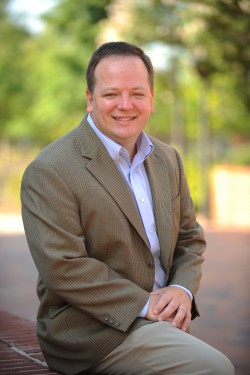 If there is one question that inspires and energizes Mark Wilson, Director of Civic Learning Initiatives in the College of Liberal Arts, it is “How can citizens work together for the public good?”
If there is one question that inspires and energizes Mark Wilson, Director of Civic Learning Initiatives in the College of Liberal Arts, it is “How can citizens work together for the public good?”
Mark has an abiding faith in people and the processes of democratic civic engagement that empower them to work together and create fair, just, and inclusive communities. He sees in Alabama assets unique to this state, and great people with great talent who together can create positive social change.
People involved in the sustainability movement tend to be motivated by a strong set of personal values, and Mark is no exception. Mark’s theological and spiritual underpinnings guide him and nurture his love and concern for the people of Alabama. As he puts it, “There is a theological and spiritual dimension to everything, and working to make our communities better is a part of that.”
Growing up in South Alabama, Mark watched his mother, a public health professional, always go above and beyond to help others. She was a model of service to those in need and he saw the difference she made in the lives of individuals and families. Mark grew up wanting to do his part to make the same kind of difference for the people of his state.
After completing undergraduate studies at the University of Mobile, Mark attended seminary and attained a Master of Divinity degree at Mercer University in Atlanta, and then achieved a PhD in history at Auburn University. After graduating, Mark spent a year at Judson College in Marion, Alabama, where he established a civic engagement program before returning to Auburn.
Here at Auburn, the Dean and faculty members in the College of Liberal Arts created a minor in civic and community engagement. Mark developed the introduction course, as well as a practicum course that takes place in Appalachia. The goal of student learning in civic engagement is to take them beyond having a service experience to having a more powerful community experience.
This is important because immersive experience in community is essential. Mark explains that technical fixes and expert advice conveyed in what are more or less one-way project-based communications only go so far in solving complex, systemic problems. Mark’s experience has taught him that solving the biggest challenges in communities, and creating futures that people want to occupy, require citizen involvement, healthy democratic processes, and political will.
Lasting impacts occur when would-be service providers emphasize building long-term relationships with people in their communities. Projects are identified and tackled in community, and emerge as a result of people developing personal relationships and caring partnerships around shared goals of community improvement. The civic engagement opportunities provided by Mark and his colleagues in the College of Liberal Arts give students opportunities to go beyond their fields of study to collaborate with others and experience the power, meaning, and impact of being in relationships in communities.
In addition to the practicum in Appalachia and the minor, Mark is also involved in long-term efforts like the Living Democracy Project, in partnership with the David Mathews Center for Civic Life. Living Democracy is a deep learning experience that goes well beyond service. Students spend ten weeks during the summer in a community working with a range of interests and different perspectives to create positive change.
Mark loves his work. He doesn’t see what he does as a job, but as an adventure; an opportunity to make a difference in the lives of students and in the communities where he works. He says he gets real reward by creating conditions where students learn for themselves, realize their ability and power to make a difference, and gain the skills necessary to be good citizens in a democracy.
The New England Resource Center for Higher Education describes an “engaged scholar” as someone who “…seeks to facilitate a more active and engaged democracy by bringing affected publics into problem-solving work in ways that advance the public good with and not merely for the public.” (emphasis added)
Sounds like an excellent description of Mark Wilson: Engaged Scholar, Sustainability Practitioner.
Post contributed by Alicia Valenti, Office of Sustainability Intern




